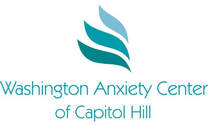The Washington Anxiety Center of Capitol Hill is the oldest psychology outpatient treatment center (est. 2016) on Capitol Hill that utilizes evidence-based treatments of anxiety, depressive, and behavioral disorders in Capitol Hill.
The psychologists at our practice employ cognitive-behavioral treatments to treat these disorders, with a special emphasis on exposure-based therapies.
Our practice serves individuals of all ages:
The psychologists at our practice employ cognitive-behavioral treatments to treat these disorders, with a special emphasis on exposure-based therapies.
Our practice serves individuals of all ages:
- Children
- Adolescents
- Young Adults
- Adults
- Older Adults
- Families.
Disorders and Problems Treated
Children and Adolescents
|
Young Adults
|
Adults
|
Disorders We Treat for Children and Adolescents
Ages 3-17
Separation Anxiety Disorder
Social Anxiety Disorder
Specific Phobia
Obsessive-Compulsive Disorder
Generalized Anxiety Disorder
Panic Disorder
Adjustment Disorder
Major Depressive Disorder
Attention-Deficit Hyperactivity Disorder
School Refusal Behavior (Due to Anxiety)
- Avoidance and/or significant anxiety in situations where there is separation from a “safe” person or place (e.g., anxiety sleeping alone at night).
Social Anxiety Disorder
- Avoidance and/or anxiety related to performance and/or social situations (e.g., speaking in front of the class, going to a party).
Specific Phobia
- Anxiety and/or avoidance of specific situations or stimuli (e.g., flying on an airplane, spiders, etc.).
Obsessive-Compulsive Disorder
- Intrusive and repetitive images, impulses, and thoughts that cause high levels of anxiety
- In response, you complete a covert (e.g., thought) or overt action (e.g., behavioral action-washing hands, etc.) to reduce the aforementioned levels of anxiety.
Generalized Anxiety Disorder
- Persistent and continuous general worries and concern about several areas in your life (e.g., finances, health, family, romantic relationships).
Panic Disorder
- The presence of panic attacks in which you experience at least 4/13 symptoms simultaneously (e.g., heart racing, sweating, upset stomach, dyspnea).
- In response, you begin to avoid certain activities, situations, people or places that are associated with such symptoms.
- Hair-pulling behaviors focused on certain areas on the body to the point of damage and/or hair loss (e.g., head, pubic area, legs, eyebrows, etc.).
- Hair-pulling behaviors in response to feeling certain emotions (e.g., anxiety, boredom, tired, excited), but not necessarily anxiety alone.
Adjustment Disorder
- Significant anxiety in response to a temporary transition (e.g., moving to a different house or school).
Major Depressive Disorder
- The presence of depressed mood for at least 2 consecutive weeks
- Feelings of helplessness, worthlessness, change in appetite, anhedonia and/or the presence of suicidal thoughts or action/plan
Attention-Deficit Hyperactivity Disorder
- The presence of hyperactive/impulsive behavior and/or deficits in attention.
- Difficulties with executive functioning skills (e.g., managing schedule, time management).
School Refusal Behavior (Due to Anxiety)
- Refusing school or certain subject classes due to the presence of an anxiety disorder.
- Strong avoidance behaviors related to school (e.g., sleeping in, not completing homework).
Disorders We Treat for Young Adults
Ages 18-34
Separation Anxiety Disorder
Social Anxiety Disorder
Specific Phobia
Obsessive-Compulsive Disorder
Generalized Anxiety Disorder
Panic Disorder
Trichotillomania
Adjustment Disorder
Major Depressive Disorder
Attention-Deficit Hyperactivity Disorder
“Failure to Launch” Syndrome
- Avoidance and/or significant anxiety in situations where there is separation from a “safe” person or place.
Social Anxiety Disorder
- Avoidance and/or anxiety related to performance and/or social situations (e.g., speaking in front of the class, going to a party).
Specific Phobia
- Anxiety and/or avoidance of specific situations or stimuli (e.g., flying on an airplane, spiders, etc.).
Obsessive-Compulsive Disorder
- Intrusive and repetitive images, impulses, and thoughts that cause high levels of anxiety.
- In response, you complete a covert (e.g., thought) or overt action (e.g., behavioral action-washing hands, etc.) to reduce the aforementioned levels of anxiety.
Generalized Anxiety Disorder
- Persistent and continuous general worries and concern about several areas in your life (e.g., finances, health, family, romantic relationships).
Panic Disorder
- The presence of panic attacks in which you experience at least 4/13 symptoms simultaneously (e.g., heart racing, sweating, upset stomach, dyspnea).
- In response, you begin to avoid certain activities, situations, people or places that are associated with such symptoms.
Trichotillomania
- Hair-pulling behaviors focused on certain areas on the body to the point of damage and/or hair loss (e.g., head, pubic area, legs, eyebrows, etc.).
- Hair-pulling behaviors in response to feeling certain emotions (e.g., anxiety, boredom, tired, excited), but not necessarily anxiety alone.
Adjustment Disorder
- Significant anxiety in response to a temporary transition (e.g., moving to a different house or school).
Major Depressive Disorder
- The presence of depressed mood for at least 2 consecutive weeks.
- Feelings of helplessness, worthlessness, change in appetite, anhedonia and/or the presence of suicidal thoughts or action/plan.
Attention-Deficit Hyperactivity Disorder
- The presence of hyperactive/impulsive behavior and/or deficits in attention.
- Difficulties with executive functioning skills (e.g., managing schedule, time management).
“Failure to Launch” Syndrome
- Young adults struggling and/or failing to develop/implement a plan to be financially, socioemotionally, and intellectually independent of their childhood caretakers.
- Strong avoidance behaviors related to pursuing a job and developing a “life plan.”
Disorders We Treat for Adults
Ages 35 and up
Social Anxiety Disorder
Specific Phobia
Obsessive-Compulsive Disorder
Generalized Anxiety Disorder
Panic Disorder
Adjustment Disorder
Major Depressive Disorder
Attention-Deficit Hyperactivity Disorder
Medical/Illness Anxiety
- Avoidance and/or anxiety related to performance and/or social situations (e.g., speaking in front of the class, going to a party).
Specific Phobia
- Anxiety and/or avoidance of specific situations or stimuli (e.g., flying on an airplane, spiders, etc.).
Obsessive-Compulsive Disorder
- Intrusive and repetitive images, impulses, and thoughts that cause high levels of anxiety
- In response, you complete a covert (e.g., thought) or overt action (e.g., behavioral action-washing hands, etc.) to reduce the aforementioned levels of anxiety.
Generalized Anxiety Disorder
- Persistent and continuous general worries and concern about several areas in your life (e.g., finances, health, family, romantic relationships).
Panic Disorder
- The presence of panic attacks in which you experience at least 4/13 symptoms simultaneously (e.g., heart racing, sweating, upset stomach, dyspnea).
- In response, you begin to avoid certain activities, situations, people or places that are associated with such symptoms.
- Hair-pulling behaviors focused on certain areas on the body to the point of damage and/or hair loss (e.g., head, pubic area, legs, eyebrows, etc.).
- Hair-pulling behaviors in response to feeling certain emotions (e.g., anxiety, boredom, tired, excited), but not necessarily anxiety alone.
Adjustment Disorder
- Significant anxiety in response to a temporary transition (e.g., moving to a different house, divorce).
Major Depressive Disorder
- The presence of depressed mood for at least 2 consecutive weeks.
- Feelings of helplessness, worthlessness, change in appetite, anhedonia and/or the presence of suicidal thoughts or action/plan.
Attention-Deficit Hyperactivity Disorder
- The presence of hyperactive/impulsive behavior and/or deficits in attention.
- Difficulties with executive functioning skills (e.g., managing schedule, time management).
Medical/Illness Anxiety
- Anxiety related to fear of having a current or undetected physical ailment or diagnoses that has yet to be detected.
- Visits to medical doctors resulting in unresolved or invalidated medical concerns.
- Excessive concerns and anxiety about physical symptoms.




